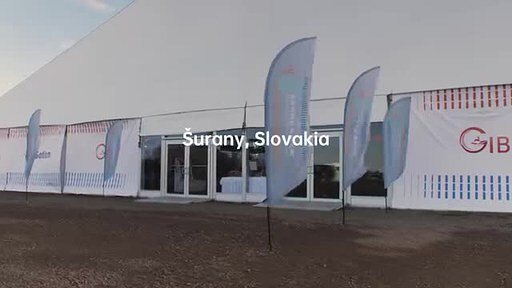
Slovakia's Gotion Gigafactory: Powering Europe’s EV Push & Challenging Supply Chain Status Quo
Gotion’s new €1+ billion battery plant in Slovakia aims to reshape Europe's EV landscape, lessening reliance on Asian manufacturers and boosting local economies. But can it overcome competitive pressures and deliver on its ambitious goals?
Slovakia's Gotion Gigafactory: Powering Europe’s EV Push & Challenging Supply Chain Status Quo
ŠURANY, Slovakia – November 15, 2025 – As Europe races to secure its future in the electric vehicle (EV) revolution, a new player is entering the fray. Gotion, a rapidly expanding Chinese battery manufacturer, has officially begun construction on its first European Gigafactory in Šurany, Slovakia. The ambitious project, representing an investment exceeding €1 billion, is poised to significantly alter the region’s EV supply chain and challenge the dominance of established Asian manufacturers.
While the fanfare surrounding the groundbreaking ceremony highlighted Gotion's commitment to sustainability and innovation, a deeper dive reveals a strategically calculated move to capitalize on growing European demand for localized battery production. The factory, slated to begin production in 2027 with an initial capacity of 20 GWh annually, comes at a critical juncture as the EU pushes forward with policies aimed at bolstering domestic battery manufacturing and reducing reliance on imports.
Addressing the Battery Independence Imperative
Europe’s ambition to become a leader in electric mobility is heavily reliant on a secure and resilient battery supply chain. Currently, the vast majority of battery production is concentrated in Asia, particularly in China, South Korea, and Japan. This creates vulnerabilities related to geopolitical risks, logistical challenges, and potential supply disruptions.
“The situation is clear,” explains one industry analyst. “Europe recognizes it can’t solely depend on external suppliers for such a critical component. Localizing battery production isn't just about economics; it's about strategic autonomy.”
The Gotion Gigafactory directly addresses this concern. By establishing a manufacturing hub within the EU, Gotion aims to provide a more reliable and efficient supply of batteries to European automakers. This localization strategy also reduces transportation costs and carbon emissions associated with long-distance shipping.
Competition Heats Up in a Crowded Market
However, Gotion isn't entering a vacant market. Established players like Northvolt (Sweden), CATL (China), LG Energy Solution (South Korea), and Panasonic (Japan) are already investing heavily in European battery production. Each company is pursuing its own strategies, focusing on different technologies, partnerships, and market segments.
“The competition is fierce,” says a source familiar with the European battery landscape. “Gotion will need to differentiate itself through innovation, cost competitiveness, and strong relationships with key automotive customers.”
According to industry reports, Gotion is focusing on LFP (Lithium Iron Phosphate) battery technology, which is known for its lower cost, improved safety, and longer lifespan, though it typically offers a lower energy density compared to NMC (Nickel Manganese Cobalt) batteries. This focus on LFP aligns with the growing demand for more affordable and sustainable EV options.
Slovakia: A Strategic Location for Battery Production
Slovakia's selection as the location for Gotion's Gigafactory is no accident. The country offers several advantages, including a skilled workforce, a favorable business environment, and proximity to major European automotive manufacturing hubs. Furthermore, Slovakia boasts a growing network of charging infrastructure and government incentives designed to attract foreign investment in the EV sector.
The Gigafactory is expected to create approximately 1,300 direct jobs in the initial phase, with potential for further expansion in the future. Beyond the direct employment benefits, the project is also anticipated to stimulate economic activity in the surrounding region, boosting local businesses and fostering innovation.
Addressing Sustainability Concerns & Local Impact
While the Gigafactory promises economic benefits, concerns regarding the environmental impact of battery manufacturing remain. Battery production is energy-intensive and relies on raw materials like lithium, nickel, and cobalt, the sourcing of which can be associated with environmental and social challenges.
“Sustainability is paramount,” stated a representative from a local environmental advocacy group. “We need to ensure that battery manufacturing is done responsibly, with minimal environmental impact and respect for human rights.”
Gotion has pledged to prioritize sustainability throughout its operations, employing advanced manufacturing processes, reducing waste, and sourcing materials responsibly. The company also plans to invest in renewable energy sources to power its Gigafactory, reducing its carbon footprint.
The Road Ahead
The Gotion Gigafactory represents a significant step towards securing Europe’s EV future. By establishing a localized battery production hub, Gotion is challenging the status quo and creating new opportunities for innovation and economic growth. However, overcoming the challenges associated with competition, sustainability, and supply chain management will be crucial for the project’s success.
As Europe accelerates its transition to electric mobility, the Gotion Gigafactory is poised to play a pivotal role in powering the revolution and ensuring a more sustainable and resilient future for the automotive industry. The factory's success will not only depend on technological innovation and cost competitiveness but also on a commitment to responsible sourcing, environmental stewardship, and collaboration with local communities.
